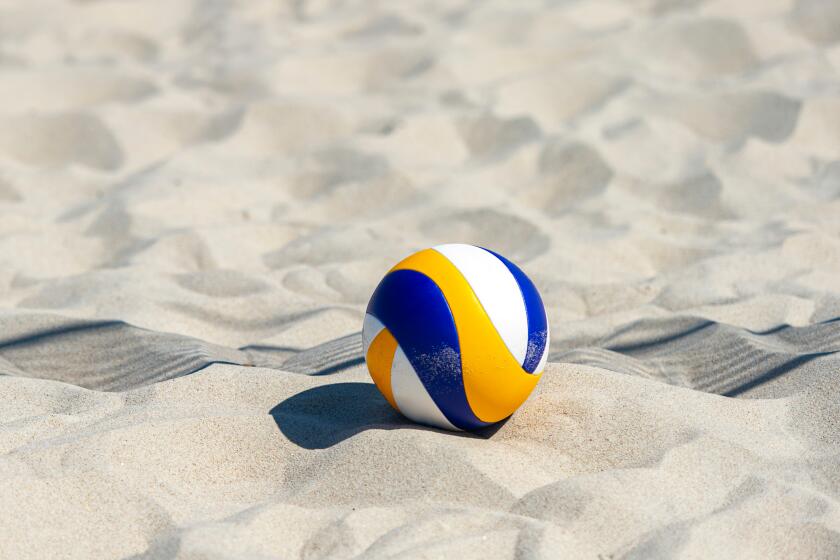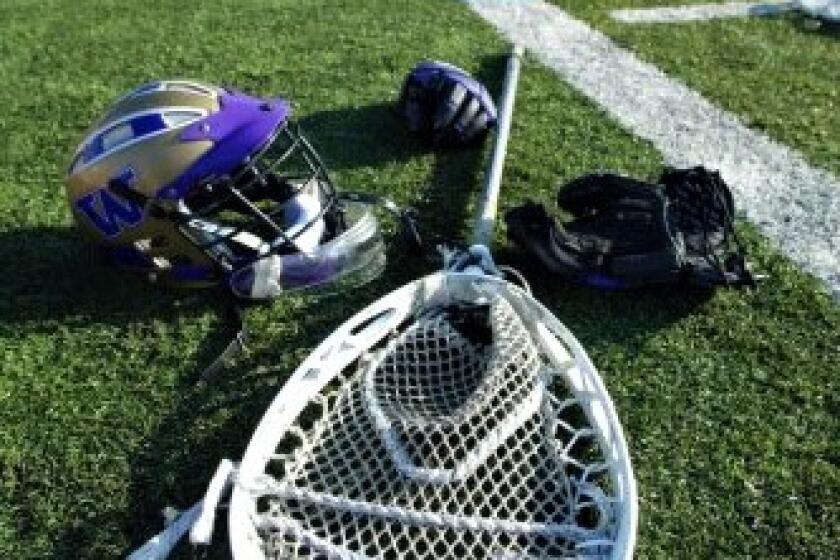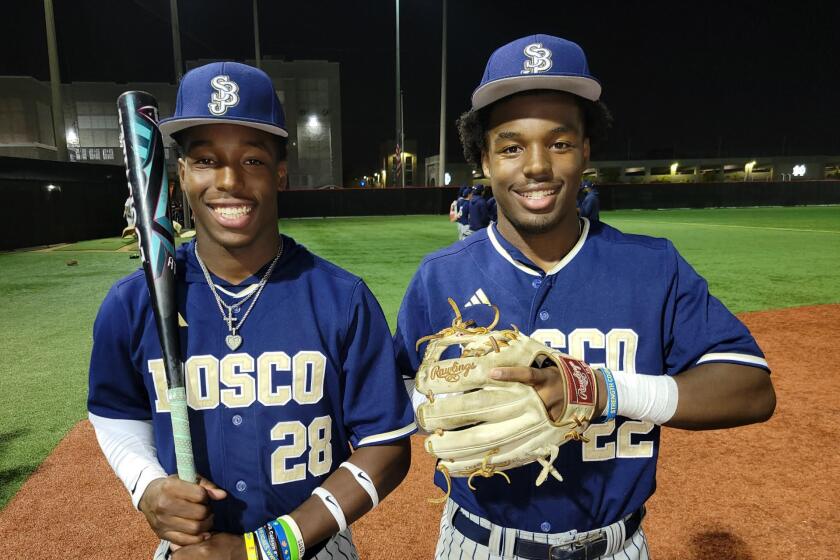Proud Enclave : Holy Martyrs Basketball Team Making History at Traditional Armenian School
- Share via
Halfway between the Ventura Freeway and Ventura Boulevard in the heart of Encino, just a short drive from numerous Valley-girl hangouts, a group of schoolgirls is talking excitedly between classes. But this conversation is even more difficult to decipher than Valleyspeak.
For every shared secret conveyed in English, two or three bits of gossip are passed along in Armenian. That’s just the first sign that the Holy Martyrs school differs radically from most of its Valley-area counterparts.
The signs posted above each doorway offer little assistance for a visitor trying to find the main office. The symbols bear no resemblance to English, and to the unschooled Westerner the language suggests a hybrid of Russian and Arabic.
Anchoring the small campus to the south is an ornate church featuring twin, mosquelike spires that make the place of worship seem like and edifice more suited for a Balkan state than one that stands as a neighbor to a White Oak Avenue luxury apartment building grandiosely named Encino Spa East.
But inside the school’s gymnasium, teen-aged boys keep step with the American beat. It’s playoff time for Southern California high school basketball players and the Armens of Holy Martyrs are part of the picture. Holy Martyrs, a 24-year-old private Christian school of 650 boys and girls in kindergarten through 12th grade, competes in the Southern Section’s Small Schools Division. No member of the team stands taller than 6-foot-1, but the Armens finished second in the Liberty League and have built an 18-6 record.
Holy Martyrs had won one playoff game before this season but has doubled that total and advanced to the quarterfinal round of the playoffs. The Armens will play host to Cate at 7:30 tonight. The Holy Martyrs girls will play Trona in a quarterfinal game at 4:30 p.m. as the first part of a doubleheader.
It has been a history-making season for a school that is acutely conscious of history.
Included as part of each team member’s daily college-preparatory curriculum are two hours of study of the Armenian language, culture, and history. More than a minor elective, Armenian study is the unifying theme for all the school’s students.
“We want to teach our students the Armenian culture and instill in them the desire for freedom and the desire for justice,” Principal Gabriel Injejikian said. “We would like our students to participate in American culture as well as keeping themselves bicultural and bilingual. We hope the conditions in the world will someday be conducive to us acquiring our lands and getting our freedom back.”
Those sentiments are shared by the basketball players, who have more than a Southern Section championship on their minds. More than dreams of college and fast cars and athletic glory, team members avow their dedication to the restoration of Armenia to its historical homeland--heady stuff for a 17-year-old.
Armenia was absorbed by Turkey and the Soviet Union after World War I, which included what Armenians call the century’s first act of genocide when 1.5 million were killed by Turks. Armenians honor the memory of those dead every April 24.
Armenians today are scattered throughout the world with heavy concentrations outside Turkey and the Soviet Union in Middle East countries such as Lebanon, Syria and Iran. According to the Armenian National Committee, which has offices in Glendale, nearly 1 million Armenians have immigrated to the United States and Los Angeles’ population of about 200,000 represents the nation’s largest concentration.
Armenians liken themselves to the Jews before the formation of the state of Israel: a people in search of a homeland.
“When I was a young boy, I told my parents I wanted to be an Armenian soldier,” senior point guard Viken Tchorbajian said. “Of course, there is no such thing because we have no country. It’s very important to me to keep our heritage alive. If we forget about our heritage, there goes our homeland and 2,000 years of history go down the drain.”
Tchorbajian averages 19.6 points and 5.6 assists a game and shares the scoring load with his best friend on the team, Armen Abramians, who averages 20.1 points and 13.1 rebounds. Abramians views his team’s success as an opportunity to expose people to the Armenian culture.
“Every time we achieve something big, the school we play gets to know about Armenians. Slowly, they’re getting to know us, getting to know the Armenian school,” he said.
The Armens have grown accustomed to opponents’ puzzlement. They no longer are a curiosity among Liberty League teams, but when they play in tournaments they are met by rounds of, “Who are you guys?”
Their jerseys feature the nickname “Armens,” which is a far cry from the more typical Eagles and Tigers and Vikings. Some opponents are so confused they think the team is named for Armen Abramians.
The team’s warmup jackets are emblazoned with the letter F, which adds to the bewilderment. The F stands for Ferrahian, which reflects the high school’s true name: the Ferrahian Armenian School. School officials thought athletic opponents would have an easier time pronouncing Holy Martyrs.
“Some teams laugh at us, but we don’t worry about it,” Abramians said. “It’s kind of good to be an underdog. When we win it gives it a bigger bang.”
The Holy Martyrs athletic department has to struggle just to qualify as underdogs. If it wasn’t for Varant Vartabedian, there would be no department.
The Armens have three athletic programs: boys’ and girls’ basketball and junior varsity cross-country. And Vartabedian coaches everything. Well, not exactly. This season, for the first time in his four years as coach, Vartabedian sought help, making Tchorbajian coach of the boys’ junior varsity basketball team.
While juggling his academic load and duties on the varsity, Tchorbajian directed the JVs to an 11-4 record and the league championship with a 7-1 mark.
“I had nothing to do with the junior varsity,” Vartabedian said. “If Viken had any problems, they were his problems. I don’t say a word.”
Then Vartabedian adds with a laugh, “That doesn’t mean he couldn’t have done it better.”
He is joking and Tchorbajian delights in the attention. Players say their relationship with Vartabedian is exceptionally close. At 28, Vartabedian seems more like an older brother to his players than an authority figure. Much of that closeness seems linked to their shared experience. Vartabedian’s story is a typical one of Armenians his age.
He was born in Lebanon and was schooled there until he was 18 when his family urged him to immigrate to the United States. The reason for leaving the strife-torn country was obvious.
“Living was hard because of the bombardment every day,” he said. “You couldn’t go to school regularly.”
Vartabedian landed in Philadelphia where he lived for eight months before moving to Los Angeles. He lived with an aunt until his parents joined him three years ago.
Few members of the team are American-born. Tchorbajian’s road to Canoga Park began in Beirut, and Abramians lived in Austria and Iran before settling in Tarzana. The two have been friends since the fourth grade (“We’re like blood brothers,” Tchorbajian said.), which adds significance to their final high school season. The two trade compliments as rapidly as most teammates trade high-fives.
“This whole team has been a highlight for me,” Abramians said. “Viken is a born leader. He coordinates the whole team. I can’t play without him. There’s a special chemistry between us.”
Tchorbajian encourages his teammate to continue playing in college, but Abramians will content himself to attend Cal State Northridge and prepare for a career as a doctor.
“I don’t think I’m a college player and I probably couldn’t make it there. Besides my studies are more important,” he said.
Plus, there’s the matter of Armenia’s future.
“That will always be our No. 1 goal,” Tchorbajian said. “They joke with us here about marrying an Armenian girl and having lots of children to send to Armenian schools.”
Is it only a joke? Would he marry someone whose name did not end in i-a-n?
“No way,” he said.
More to Read
Get our high school sports newsletter
Prep Rally is devoted to the SoCal high school sports experience, bringing you scores, stories and a behind-the-scenes look at what makes prep sports so popular.
You may occasionally receive promotional content from the Los Angeles Times.





